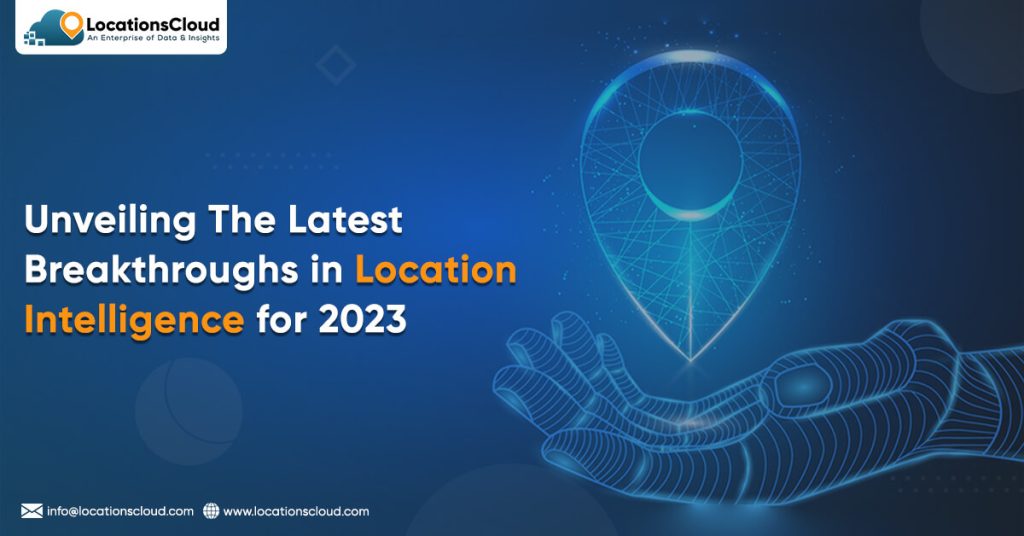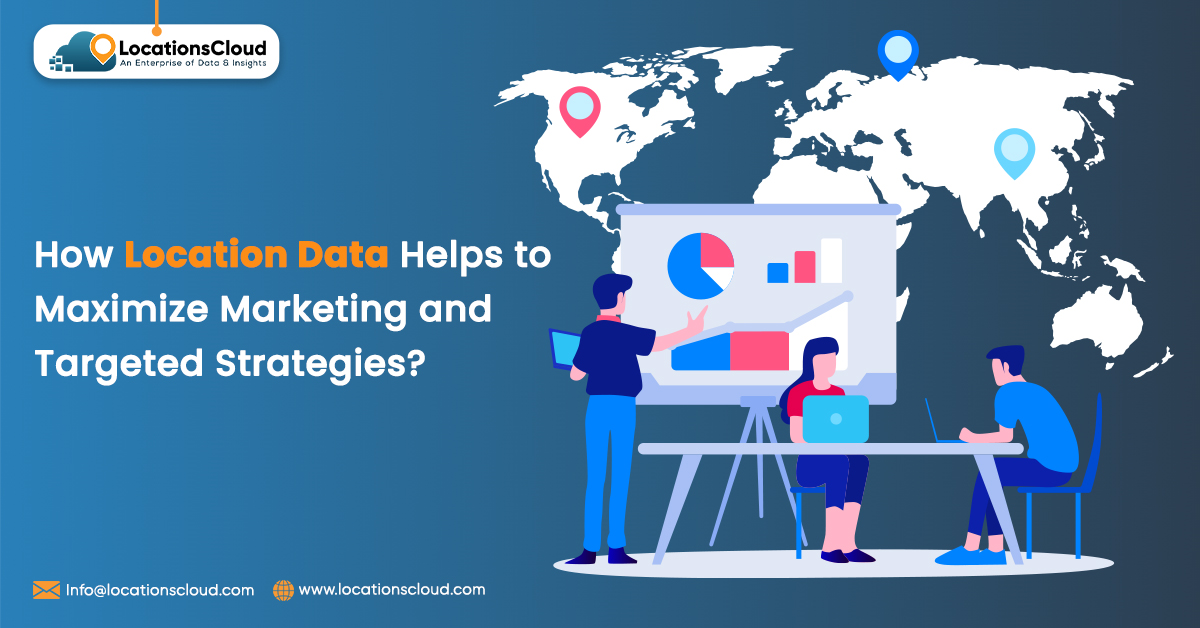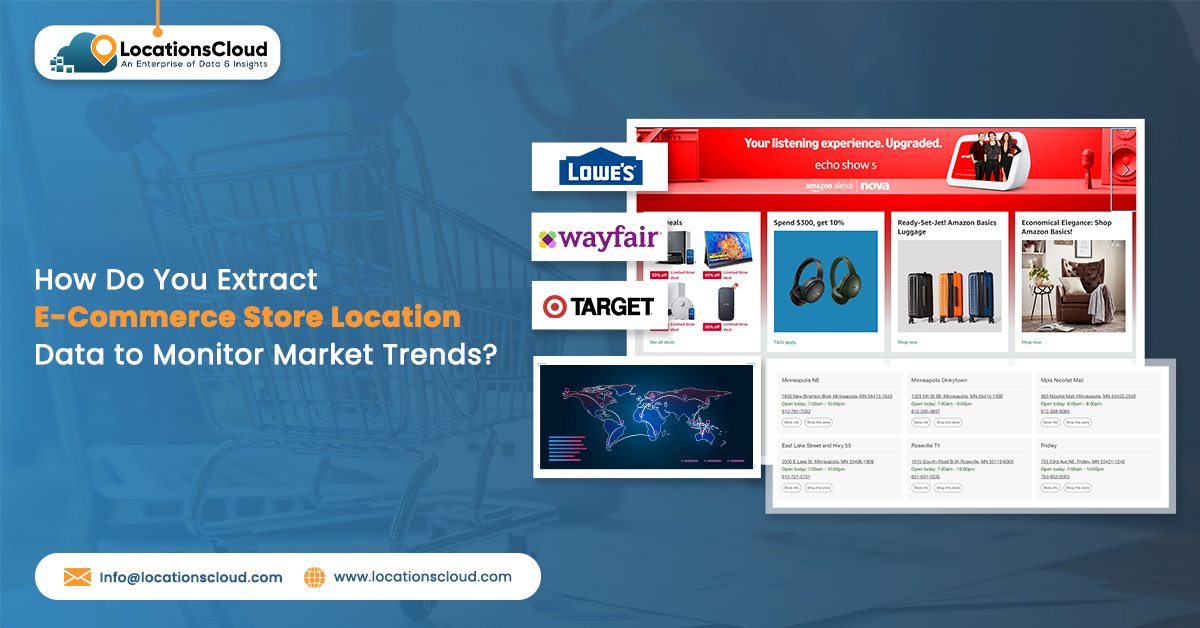
Location Intelligence is an important part of modern business operations. It is because it gives companies valuable information about customer behavior. You can learn about market trends and competitive environments. As we get closer to 2023, there will be big changes in how businesses use location information. They will use it to make plans and run their businesses.
This blog post will discuss some of the most recent finds and innovations in location intelligence. These include adding new data sources, making different use cases, and progressing in machine learning and artificial intelligence. Understanding the latest changes in location intelligence can help businesses stay on top of the game. Moreover, they can use this powerful tool to grow and be successful.
Location intelligence tools and data have been essential for business decisions in various fields.
This has been around for a long time. The program has been going through many changes and adding more features. Location intelligence is always getting better. As a result, it can give correct results when you collect location data.
Businesses then use this information to change and improve their internal functions and marketing efforts. As a result, they can do better in the market. Different kinds of data can be pulled out and used. This can help to improve the customer experience. As a result, the image and value of the business are enhanced as a whole.
The Importance of Location Intelligence
One of the main reasons why location intelligence is so helpful for businesses is that it can gather location data and give useful information. But the following can help you figure out what the exact benefits of the system are:
Taking Critical Actions:
Location-based intelligence lets organizations make decisions based on solid, well-informed facts. Businesses can figure out where to open new shops or offices by looking at information about the location, such as the population, the number of rivals, and customer demand.
Client knowledge:
Using location information can help businesses learn more about their customers. Businesses can make their ads more effective by looking at where and how customers act to find trends and preferences. Organizations can use it to offer services in specific areas, make their services more personalized, and improve their promotion strategies.
Functional Effectiveness:
Location intelligence makes operational efficiency the best it can be by analyzing geographical data. It helps companies save money on shipping, find the best routes, and get the most out of their supply lines. Using changes in demand from region to region helps distribute resources, track goods, and find new employees.
Risk Evaluation and Management:
Location intelligence looks at spatial information to help evaluate and avoid risk. Depending on the area, it lets organizations look at possible dangers like natural disasters, environmental problems, or safety risks. With that information, they can devise good ways to control risks.
Competitive Benefit:
Location intelligence gives companies an edge over their competitors by letting them know about changes in the market, how customers act, and what might happen in the future. Companies can use it to find places that haven’t been built up yet, find out about their competitors’ sites, and make custom marketing plans.
Infrastructure construction:
Location intelligence helps urban planning projects by giving knowledge on infrastructure design, transit planning, and zoning research. Making the best use of resources and improving public services helps make towns that are good for the environment and can survive.
What Distinguishes Location Intelligence from Business Intelligence?
Location and business intelligence may sound the same at first, but they are very different. Among the differences between the two, the following stand out:
Geographical Perspective:
Location intelligence focuses on looking at data in the context of geography or territory. To learn about habits, relationships, and changes, including geographic information, such as addresses, positions, and borders, is important. On the other hand, business intelligence doesn’t focus on geographic context in a specific way. Instead, it uses a broader range of statistical analysis, including accounting, operations, and customer data.
Geospatial Research:
Location intelligence pulls information from geographic information using geospatial research methods. It lets companies do geospatial searches, map visualization, geographical grouping, closeness rating, and other location-based tasks. Even though data visualization, disclosure, and figures may be part of business intelligence, geographic evaluation is usually not a top priority until it is directly linked to location information.
Particular Functions:
Location intelligence has been used in areas where understanding of geography is essential, such as real estate, transportation, urban planning, business, and environmental monitoring. On the other hand, business intelligence has a broader range of uses across firms and focuses on making general decisions based on data, tracking efficiency, and planning strategies.
Information Resources:
Location intelligence relies heavily on geospatial data sources, such as geographical information systems (GIS), GPS locations, maps, etc. Business intelligence can use various data sources like transaction files, CRM, and ERP systems. However, GPS-based records might not always be used unless they are essential to the company’s situation.
The Current Trends of Location Intelligence in 2023
Since location data is so important for business growth, many new ways exist to make systems more accurate. In 2023, some of the most interesting breakthroughs and trends in location intelligence will be:
Real-Time Data
The lack of real-time data has been one of the biggest problems with location intelligence. However, this problem will be fixed when the new changes are implemented in 2023. Users could get location information in real-time, which would help them make better choices and decisions at any time.
Crisis Aversion:
With the new upgrades to location intelligence, users can collect location data to check for crisis or disaster scenarios. Then, this information can be used to change methods and stop large-scale damage. This knowledge can also be used to prevent disasters. It can be stopped by taking steps called “mitigation.” Location data can also clear out areas likely to be hit by disasters, saving lives. This is based on how densely people live in a certain area. It depends on how bad the damage is expected to be.
Smart City Management: Governments
Governments plan smart cities that are more environmentally friendly and sustainable. As a result, location intelligence can help improve solutions. This is possible to give accurate information about demographics, and they can provide info about the availability of resources—moreover, details about the potential of any place to become a smart city and more.
Location Intelligence Challenges:
Location intelligence has a lot of perks. It is when it comes to collect location data. However, it also has a lot of problems. Some of the most usual problems with this are:
Data Integrity and Effectiveness:
Geographic information from different sources may differ regarding reliability and consistency. It can be hard to make sure that data is correct and combine different data sets. Intelligence-based location systems can be unreliable. They may not work as well as they could. It is if they have old or missing data or different geographical shapes. Or maybe mistakes in their information standards.
Confidentiality:
Geographic data often contain private information, like a client’s address or the property’s location. It might be hard to keep this information safe and follow the rules about keeping it secret. Businesses must set up robust security policies when they collect and use location data. They need to make sure that communication and storage are secure.
Moreover, they should get the proper permissions.
Data amount and complexities:
When using high-quality geographic information or real-time information flows, geographic data can be vast and hard to understand. Big databases may put a strain on computer power. So, they need a scalable platform and the right ways to control data. This will help to handle the amount and complexity of information.
Experienced Executors
Location intelligence requires a wide range of specialized skills. It is such as geographical modeling and spatial evaluation. Moreover, it can show information clearly. Organizations may find it hard to find and keep workers. They want those with the right skills in geospatial methods, statistical analysis, and specialized knowledge. Moreover, they need to use location intelligence well.
Price and Resource Distribution:
Putting in place and having up-to-date location intelligence technologies can be very expensive. These costs include hiring staff, keeping tools in good shape, and licensing programs. Organizations need to spend their money wisely. They must ensure that the costs of location information are worth the benefits they bring.
Conclusion
One of the most critical parts of getting location info is knowing how to use it well. Because it can be used for many different things, it is easy to use the information it collects incorrectly.
But businesses need to follow compliance rules and use data. They must do it in a way that helps the business. Moreover, it shouldn’t hurt the brand’s image or break the law. Using location-based info helped the company grow, making it a vital resource.




